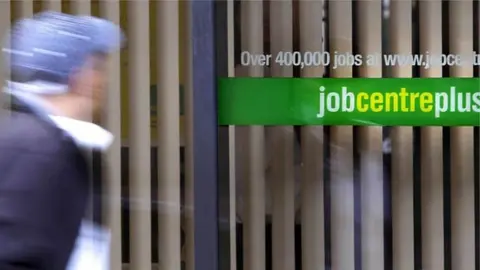Unemployment: Wales jobs not yet hit by Covid lockdown
 BBC
BBCThe latest unemployment figures suggest the full force of lockdown has not hit jobs in Wales to a significant extent.
The rate of unemployment in Wales between April and June was down at 2.7% with 8,000 fewer people unemployed than between January and March, Office for National Statistics (ONS) figures show.
That is 20,000 fewer than the same period a year ago.
The rate of unemployment across the UK was higher at 3.9%.
The figures do not include the millions of people who are furloughed, those on zero-hours contracts but not getting shifts, or people on temporary unpaid leave from a job, as they still count as employed.
In June, 316,500 employees in Wales were paid 80% of their salaries under the UK government's furlough scheme, figures from the Treasury showed.
As such, today's figures do not capture the full impact of the pandemic.
The number of people on the payroll across the UK in July was down by 730,000 compared with March as coronavirus hit, the largest quarterly decrease in more than a decade.
This could act as an indication that many more job losses are to come in Wales.
The level of economic inactivity - the number of people in Wales who were not working and not available to work - between April and June was 432,000, which is 11,000 fewer than between January and March this year but 15,000 more than April to June last year.
Those are the people who cannot work because they are ill, caring for someone or in full-time education.
There were 41,000 people unemployed but able to work between April and June.
'It can feel a little bit bleak'

For Vic Phillips the last few months have been a whirlwind of emotions.
Since the end of July, the father-of-one, from Brecon, Powys, has been furloughed, under the UK Treasury scheme, after the Wales Millennium Centre, in Cardiff Bay, closed due to lockdown.
With shows cancelled until at least January, the deputy tech manager, who has worked in theatre for 15 years, has now been made redundant.
With no date for when performances might resume, Mr Phillips said he had felt anxious about being able to pay bills and provide for his family and knew he needed to change career.
"It doesn't feel like the normality of changing jobs, where taking someone out of position leaves a hole that's filled," he said.
"There are people that are trying to find work and there aren't extra jobs, if anything there's less.
"That feels very challenging and at times it can feel a little bit bleak."
But having fallen in love with gardening and enjoying spending more time with his family during lockdown, he is now using it as an opportunity to "embrace" other options outside the world of theatre.
 Getty Images
Getty ImagesMyke Jones, from Cwmbran, was working in IT but lost his job at the beginning of the pandemic. He is now trying to apply for new jobs at the age of 58.
Speaking to the BBC Radio Wales' Breakfast programme, he said he had already applied for two jobs before 08:00 BST on Tuesday.
"It's a big competition, I've noticed a huge difference in the past couple of months in the fact that jobs are few and far between. You're looking at 200-plus people applying for those jobs.
"I've spent ages on my CV trying to make it look flashy and say the right things, but the video interview comes along and the moment they see you, you can tell they see straight away 'you're quite old' and they tend to shy away.
"I struggle to pay our bills, we've got mortgages to pay, I can't see my pension covering it all so I'm going to be working for a long time yet. I can see a lot of travelling and staying away from home."
Mr Jones has also been recovering from cancer during lockdown.
"We live in a flat, we haven't got a garden, I need to be a bit more careful so I don't go out as much as most people and that worry I've got about cancer returning just adds to the mix of 'I'm struggling to find a job, how will I pay the bills next month'."
Jonathan Athow from the ONS said: "The labour market continues recent trends, with a fall in employment and significantly reduced hours of work as many people are furloughed.
"Figures from our main survey show there has been a rise in people without a job and not looking for one, though wanting to work.
"In addition, there are still a large number of people who say they are working no hours and getting zero pay.
"The falls in employment are greatest among the youngest and oldest workers, along with those in lower-skilled jobs."
He said the number of vacancies began to recover in July, especially in small businesses and sectors such as hospitality, though demand for workers remains depressed.
'We can expect to see unemployment rise sharply'
 Gerwyn Davies
Gerwyn Davies
Gerwyn Davies from the Chartered Institute of Personnel and Development (CIPD), the professional body for HR and people development, said: "The jobs market appears resilient on the surface, partly because the official statistics lag events by a couple of months.
"Despite this, the rise in the number of economically inactive people and the fall in the number of self-employed people shows that the current economic situation is already having an impact on the labour market.
"And with a spike in redundancies over the coming months now almost inevitable due to the unwinding of the Job Retention Scheme, we can expect to see unemployment rise sharply too."
Rebecca Wooley, director of Citizens Advice Cymru, said their data showed groups most likely to face redundancy included parents, carers and those who have been shielding.
She added: "Our biggest worry is we predict an increase in those numbers once the furlough scheme ends.
"Even now, we're helping one person every two minutes with a redundancy issue."

Analysis
So why is unemployment and economic inactivity still falling in Wales?
One reason is the various schemes from the UK government to keep people on payrolls, meaning they have not been made redundant so far.
The Job Retention Scheme, in particular, allowed employees to be furloughed on 80% of their salary, paid for by the UK Treasury.
More than one in four of the Welsh workforce has been furloughed and the fear is that when those schemes end in the autumn many will not have a job to go back to.
But are those who are predicting unemployment levels like the 1930s "doom mongers"?
These figures might seem surprising when organisations such as the Bank of England are warning of unemployment levels the like of which we have not seen for decades.
They are a reminder that the detailed analysis by the ONS, which includes a breakdown for what is happening in Wales, lags several months behind what is happening to individual people and workforces.
It is interesting that the West Midlands, Yorkshire and Humber, and the north west of England are following a similar pattern.
Economies there are more similar to Wales and less like the behaviour of the south east of England, for instance.
Another report from the ONS, looking specifically at employment in July across the UK, is much more concerning.
It shows that the number of people on the payroll was down by nearly three-quarters of a million (730,000) in July compared with March when coronavirus hit.
That is warning of what is on the horizon.
